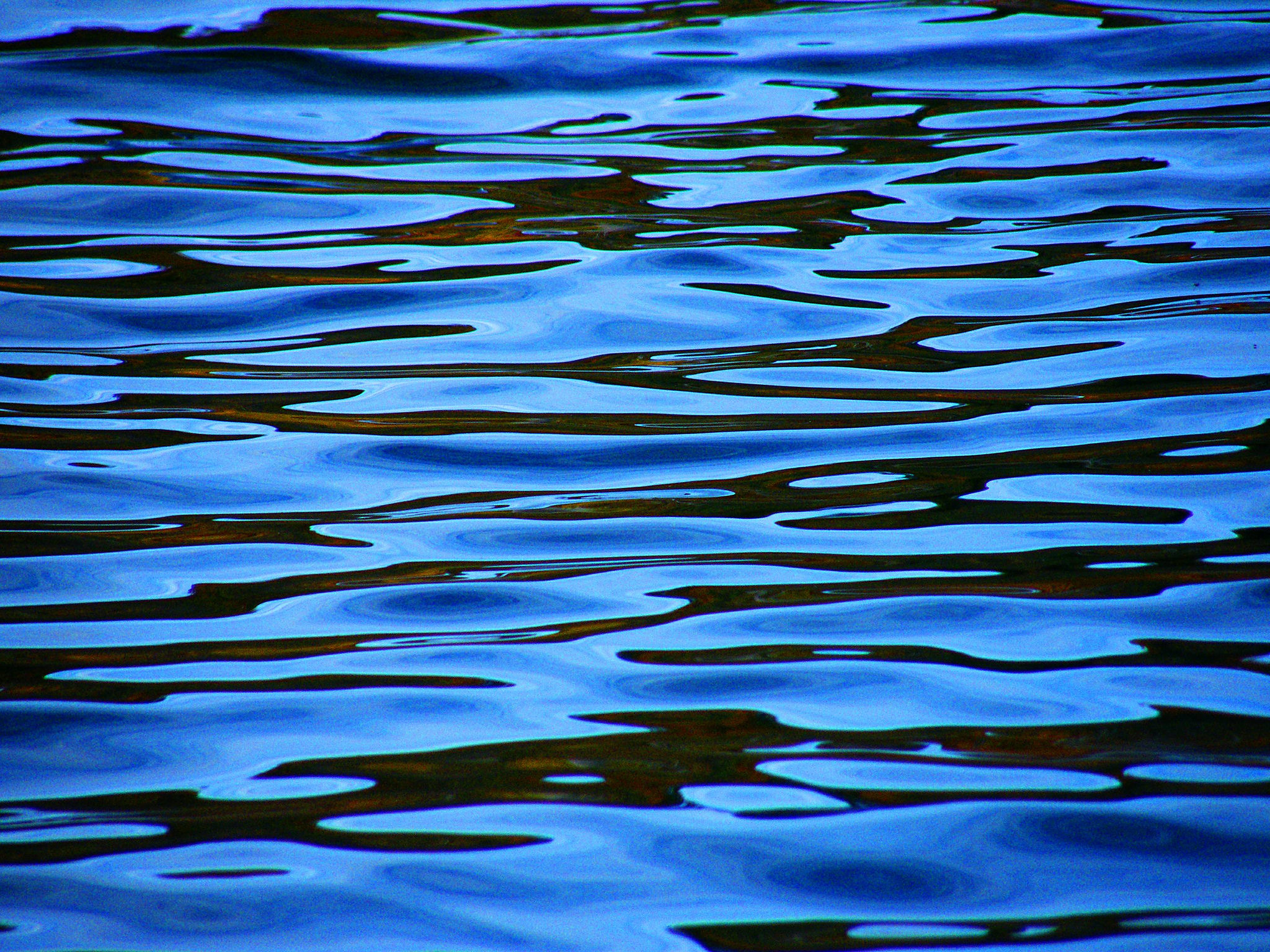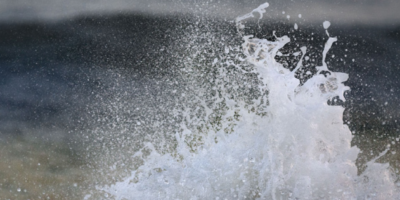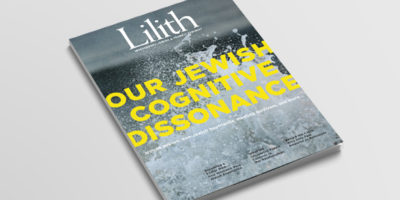
Lonely Planet Mikveh
"We've palmed two flashlights off the resort owner, mumbling that we like to take midnight swims."
On the Third Day of Creation, God gathered the lower waters together and called them “seas.” The Hebrew word for this gathering is mikveh.
I am in my neighborhood mikveh in Jerusalem. The paint is peeling, and rusted exposed pipes hiss from each cubicle. I reach for my plastic packet from the Ministry of Religion (light-green sponge, foil packet of liquid soap, foil packet of generic shampoo) and encounter another long black hair. I remove it from my body. One stray hair and my dunking won’t be kosher. I wrestle with the foil, then rip it open with my teeth. I have armed myself with a second towel (appropriated when the attendant’s back is turned) and added a grey pumice stone to the loot. The ritual pool here is teensy: six steps and just enough room to turn around.
A mikveh must contain at least 200 gallons of water, the equivalent of 40 sa’ah, a measurement used in biblical times. The number 40 in the Torah always signals transformation. The flood lasted 40 days. Moses was on Mount Sinai 40 days and 40 nights. Israel wandered in the desert for 40 years.
The place is a dump, but the mikveh attendants’ blessings are always worth it. As I climb up the steps, she holds an outstretched towel between us: “May you be blessed with health, an auspicious month, an auspicious week, a good income, healthy children, happiness, peace, all that your heart desires.…” I make sure to answer: Amen, Amen, Amen.
Once a pool has the status of a mikveh, it doesn’t ever lose it.
A mikveh imparts movement from one state to another: hence, emerging from a mikveh is a rebirth. In biblical times, a mikveh was used to transform something from a state of tumah to a state of tahara — two words that are often poorly translated as “unclean” and “clean,” resulting in misconceptions that mikvaot are essentially bathtubs, which they are not. “Impure” and “pure” are better translations, capturing the spiritual essence.
I am on the Upper East Side of Manhattan looking for the Chabad mikveh. I have the address written down, but still walk past the unmarked door several times before I realize this must be it. I wave into the security camera and am buzzed in. A few minutes later I am alone in a room with a deep tub surrounded by white marble, a stack of fluffy white towels, a gleaming hair dryer, and artfully arranged spa amenities. There is a makeup mirror and subdued lighting. No sound comes from the carpeted hallways, but plenty of harp music is being piped in from somewhere. This looks more like a suite at the Four Seasons than a mikveh. I suddenly understand why no Jews from New York ever want to leave.
A mikveh can be used by worshippers wishing to enter the Temple sanctuary (though this doesn’t exist anymore), by men wishing to enter the Sabbath, by converts, by women in a state of niddah, by pots and pans, by silverware and dishes, by a High Priest (though we don’t have these anymore), or for the purpose of removing any ritual defilement associated with death.
A woman’s menstrual period signals the end of a possible life. This might seem melodramatic until you know someone who is having trouble conceiving. A woman, after any discharge of blood, enters a state of niddah until she can count seven “clean” days and also immerse herself in a mikveh. Niddah comes from the word nadad, meaning “removed or separated.” During this time she cannot have sex with or even touch her husband.
We are on the island of Kauai where an empty crescent of beach, under nodding palm trees, curves and stretches and curves again. Strands of Plumeria exhale their scented breath and everywhere the night is blooming. Stars light up the carpet of white sand which is soft, then wet, as it strokes the neck of the Pacific heading towards California. Surprisingly, there is no one else out here. The setting reeks of romance. You’d have to be in a coma not to want to have sex here.
Any body of natural flowing water, such as a river, spring, sea or ocean, can be used with the proper accompanying prayers as a mikveh. The Torah describes the world’s most primitive state as water. When a person immerses in the mikveh, that is, they place themselves inside God’s creative power.
We are on a nature reserve in Baja, California, home to brown pelicans and schools of dolphins. We’ve palmed two flashlights off the resort owner, mumbling that we like to take midnight swims. “These should help you see the scorpions,” he says, “but watch out for stingrays.”
This is news to me. Unwelcome news. Stingrays, apparently, love this bay. They sleep in shallow water under a light dusting of sand. “Yep, they just blend into the bottom,” the owner adds, “but when you step on them, that spiked tail just shoots up and gets you in the calf.” He chuckles. “Feels exactly like a bullet.”
On the Second Day of Creation, God said, “Let there be a firmament in the midst of the waters. And let it divide water from water.” The waters, once united, are now separated forever, locked into their Upper and Lower Worlds. Some sages believe this created Longing. Others believe it created Argument and Discord, since God does not say on this Day, “And it was good.” Instead, God says, “And it was so.”
Everyone else in the Stehekin campground is tucked into their cabins, all snuggly under their covers, even though it’s mid-July. The stars are out and the glacier-fed lake, when I toe-test, feels like ice cubes.
“I can’t believe I’m doing this,” I mumble, pulling off my winter fleece and sweatpants. I’m beginning to understand why Orthodox Jews don’t go anywhere.
“I’m right here if you need help,” my husband says, but he clearly has no intention of going anywhere near the freezing water.
“Just get it over with,” I tell myself. But when I jump in, it’s an electric shock, a physical blow. It doesn’t even feel like cold. I am a marmot, a mink, an otter. I come up for air and see my husband has wandered over and is peering over the edge.
“You son of a bitch,” I shriek. “Why don’t you have to do this?”
The laws of ritual immersion come under the category of chukim: decrees of God that are not always understood. The lack of an obvious reason for chukim makes them acts of faith.
The Ishbitzer Rebbe (Rabbi Mordechai Leiner, author of Living Waters) refers to tumah and tahara as states of being “closed” or “open,” “shut down” or “receptive.” Therefore, death — the final shutting down — imparts the ultimate state of tumah, just as flowing, living water reverses this, imparting tahara by virtue of its constant movement and possibility. According to the Ishbitzer, anger — which shuts you off from the surrounding world — also creates a state of tumah.
I am in the mikveh in Rehavia, which is not the fanciest mikveh around, but it has the latest hours. I am not feeling pure tonight. I’m feeling pissed off. I’m in a rush. I don’t have time for this. It took me 20 minutes just to park. As I jam my hand into my toiletry kit, the razor on top slices off a little piece of my finger. Blood gushes everywhere. Then I can’t get my effing wedding ring off. I start jamming the bell for the attendant. Banging on the door. “Help. I need some help in here!”
In a ritual immersion, there must be absolutely nothing that intervenes between one’s body and the water. Achilles, in other words, was not properly immersed. Neither was Siegfried. The entire body must go under: a misplaced pinky or even a clinging dot of glitter will render the immersion invalid.
It is customary to immerse three times. One explanation for this is that the word mikveh occurs thrice in Torah.
I am in the renovated mikveh in Katamon staring at the back of the door. There is a laminated prayer to be recited before immersion, but it’s really long, so I focus on the handwritten sign instead: “Stealing time is worse than stealing money. You can never give it back. Be considerate. There are others waiting to use this room.”
I am currently waiting for the woman who managed to get into the ritual pool before me to finish up. Every time she immerses completely without touching the walls the attendant pronounces “kosher.” It slowly dawns on me that the woman is taking on extra holy immersions. I stand there in my towel, shredding a Q-tip while she continues to dunk and dunk and dunk. After 30 dunks, I stop counting and start imagining all the things I’d like to say to her.
According to Jewish law, every community is obligated to build a mikveh. This takes priority over building a synagogue, buying a Torah scroll, or any other commandment. One may even sell a Torah to pay for it: harmony between a husband and wife takes precedence over studying the word of God.
We are at a ranch in Wyoming. Cody, the closest city, is two hours away. And while they have a very public swimming pool here (and a rodeo), neither of these helps my
current situation.
We are having a heated “discussion”: Does a hot tub in the woods constitute a mikveh. I strongly doubt it, but my spouse’s interpretations of halacha tend to bend to fit occasions. He is adamant. “It’s rainwater, don’t you see?”
He splashes his hand around, moving aside dead leaves and other things I don’t want to examine closely. “A mikveh,” he deadpans. “’Untouched by human hands!’”
He’s riffing on halachic text — a kosher mikveh requires water “untouched by human hands.”
“Not funny,” I say.
In the middle of the story of Adam and Eve, after describing the Tree of Knowledge of Good and Evil, the Torah interrupts with a non-sequitur: “And a river went out of Eden to water the garden: and from there it split and became four headwaters.” Then the story continues, the river never mentioned again.
The Talmud states that all the water in the world has its roots in this original river of Eden, and even though we can never re-enter the Garden itself, whenever we associate with organic, living waters, we are linked to Eden.
We are in Eilat on a perfect August night, the air sheer perfume. If the Red Sea isn’t a cosmic bathtub, I don’t know what is. A long pier extends from the beach out into deeper waters where a step-ladder beckons. “I’ll stay here and wait,” my husband volunteers. “Just walk to the end and slide in.”
There’s only one problem. Despite the extremely late hour, the beach remains packed with vacationers. Radios play, barbeques sizzle, the smoke of grilled chicken and lamb kabobs wafts through chatty groups in their beach chairs, and, oh, did I mention the full moon?
For someone who craves privacy, I seem to be constantly taking off my clothes on public beaches. In fact, it all blurs together: Skyros. Astypalea. the Seychelles. Wasn’t there someplace in Thailand, or was that Belize?
“Forget it,” I hiss. “No way. I’m too old for this. I want a bathtub. I want a door with a lock.”
So we grab a cab and head into the more pedestrian section of the city, back to where the real folks live, the restaurant workers and grocery store owners, the non-vacationers. And, lo and behold, there is a small white building housing a mikveh. I beam at the attendant as she opens the door.
“Thank God you’re here,” I start to blather. “You won’t believe what I was about to do.”
Jane Medved is the poetry editor of The Ilanot Review, an online literary magazine. Her work has been published in numerous journals and will appear in the forthcoming anthology Manifesting the Female Epic (Lark Books). A native of Chicago, she lives in Jerusalem.



